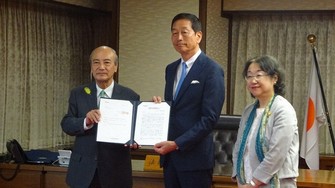
(Getty Images)
TOKYO — Some 83% of Japanese companies in a recent Mainichi Shimbun survey say they strongly or moderately agree that diversity, equity and inclusion (DEI) initiatives, such as recognizing common-law and same-sex marriages, are required to secure talent.
The 64 responding firms — most requesting anonymity — were asked if they agreed that DEI was needed to attract workers. Forty-two (66%) said they “strongly agree,” while 11 (17%) answered that they “somewhat agree.”
As Japan’s birth rate continues to decline, the current “seller’s market” for job seekers continues. Promoting DEI initiatives, alongside improvements in pay and work style reforms, has become an increasingly significant priority for companies trying to lure top talent.
Becoming a key factor in candidates’ job choices
In the United States, there was a surge in anti-DEI sentiment following the inauguration of President Donald Trump, prompting certain companies to pull back from inclusivity measures. Yet, in Japan — where progress on DEI initiatives has been comparatively slow — there has been little noticeable reactionary pushback against these efforts.
Agricultural machinery maker Kubota Corp., which indicated strong support for DEI, stated, “With the declining birth rate and population outflow, it is essential to respect diverse values and lifestyles in order to secure talented individuals.” Similarly, a chemical manufacturer, which answered that it somewhat agreed with promoting DEI, noted, “Whether a company respects employees’ lifestyles has become an important factor for job seekers when choosing a company.”
This trend is supported by a survey from employment agent Gakujo Co., which gathered responses from around 280 students expected to graduate from university in spring 2026, more than half of whom said they “pay attention” to a company’s diversity and inclusion activities. Combined with the corporate responses, this finding suggests that students are increasingly likely to choose employers that demonstrate consideration for diversity.
30% say allowing premarital name use increases administrative burdens
In 2024, industry groups such as the Japan Business Federation (Keidanren) and the Japan Association of Corporate Executives began advocating for legal changes recognizing selective separate surnames for married couples. One driving factor behind this push is the increasing number of female managers in many companies, making professional problems caused by changing one’s surname after marriage impossible to ignore. And even if a person can use their premarital name at work in Japan, not using their legal name may not be understood in overseas business settings, often negatively impacting career development.
Not a single company told the Mainichi that they forbid employees from using their premarital surnames professionally. However, the practice creates administrative burdens for companies. Because premarital names often cannot be used on payroll-related bank accounts, extra checking and verification becomes necessary. Additionally, mailed items are sometimes returned undelivered due to name discrepancies.

In this June 28, 2024, file photo, Keidanren Committee on Diversity & Inclusion head Masahiko Uotani, center, presents a written request for the introduction of a selective separate surname system for married couples to then Justice Minister Ryuji Koizumi, left, in Tokyo’s Chiyoda Ward. (Mainichi/Yuki Machino)
Twenty firms, or about 30% of respondent companies, acknowledged a “significant” or “moderate” administrative load due to allowing premarital name use. When asked about the proportion of all their employees using premarital names, most responses fell between 5% and 8%, though answers ranged up to 20%.
40% favor selective separate surnames for married couples
When asked whether they supported a selective separate surname system for married couples, 25 companies (39%) answered that such a system “should be introduced,” whereas only one company said it “should not be introduced.” However, 34 firms (53%) refrained from answering. One construction company explained, “It’s difficult to publicly state positions on the issue,” reflecting a likely reluctance to take a stand on political matters not directly linked to their business.
Companies favoring separate surnames provided reasons including, “From the viewpoint of international human rights standards, forcing one party to change their surname is undesirable” (from a transportation firm), and, “Considering the complexities encountered when someone using their premarital name professionally goes on overseas business trips, those forced to change names are unfairly burdened” (from an electronics manufacturer).
(Japanese original by Makoto Fukazu, Tokyo City News Department)


AloJapan.com